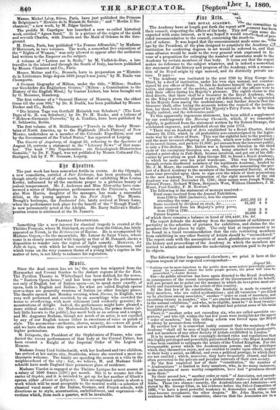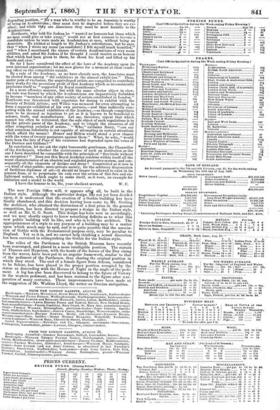The followin g letter has appeared elsewhere ; we print it here
at the express request of our respected correspondent— August 25.
"Nothing can be more injurious to the public than mean artists powerfully patro- nized. In academies where the little people govern, the great will soon be proscribed."—Jamas BABAY.
SIR—As public attention has been again directed to the Royal Academy, in consequence of the recent interposition of the Government in its behalf, will you permit me to point out the manner in which its laws press most un- fairly and injuriously upon the artists of this country. By the first law of its constitution, the Academy is made to consist of forty members, who are called academicians; and all vacancies " are filled up by elections among associates," another " order or rank of members, not exceeding twenty in number," who "..are elected from among the exhibitors in the annual exhibition," and who, to be eligible, must be "at least twenty- four years of age," an age at which Raphael had painted some of his most beautifulpictures. There is "another order not exceeding six, who are called associate en- gravers," and who till within the last few years were ineligible for the upper order of members," but this trifling reform was forced upon the Royal Academy by pressure from without. By another law it is somewhat rashly assumed that the members of the Academy "shall all be men of high reputation in their several professions, and not members of any other Society of Artists established in London." It is by means of these few cunningly-devised rules and regulations that this h ighly privileged and powerfully patronized Society—the Royal Academy —has been enabled to subjugate the artists of the United Kingdom. For the irresponsible power which the Academicians possess, and the privileges which they, themselves enjoy, and are enabled to confer upon others, impart to their body a social, an official, and even a political prestige, to which they are not entitled; which, moreover, they have frequently abused, and have often perverted to the private and peculiar interests of their own society. By the first empirical law of their "constitution," the number of "Academicians" is limited to forty members, who, in too many instances, to the exclusion of more worthy competitors, have had "greatness thrust upon them." By their second law, "another order.or rank" of Associates, not exceed- ing twenty in number, are placed in a probationary state—a kind of artistic limbo. These two classes—namely, the Academicians and Associates—are dated by Mr. George Clint, in his evidence before the Select Committee of 1836, "to have a most powerful tendency to demoralize each other—one class become sycophants, the other despots." Mr. John Martin, in his evidence before the same committee, observes that the Associates are in a
degrading position, "f 6r a man who is worthy to be an Associate is worthy of being an Academic n ; they must first be degraded before they are ex- alted ; and while t3ey are Associates they must be most humble to the ' Academicians. Northcote, w told Sir Joshua he " wanted no honours but those which no man could give or take away," would not at first consent to become a candidate unless he were made an Academician at once, without being an Associate. He yielded at length to Sir Joshua's solicitations, but he bays, that "when I wrote my name (as candidate) I felt myself much humbled," and " when I mentioned the names of certain Academicians of very mean abilities, and asked Sir Joshua if he thought I could receive as an honour that which had been given to them, he shook his head and lifted up his hands and eves."
So far I have considered the effect of the laws of the Academy upon its own internal organization ; let use now glance for a moment at their crush- ing effect on the competitors outside. By a rule of the Academy, as we have already seen, the Associates must be elected from among "the exhibitors in the annual exhibition." Thus, under pain of exclusion, the unprivileged artists are compelled to contribute their works for the pecuniary profit of that Academy which so inconsistently proclaims itself as "supported by Royal munificence." In a more offensive manner, but with the same ulterior object in view, the rule was framed by which the Academicians are imperatively forbidden to become "members of any other society of artists established in London." Northcote was threatened with expulsion for daring to exhibit with the Society of British Artists; and Wilkie was menaced for even attempting to form a separate exhibition of his own pictures,-and thus indirectly com- peting with the annual exhibition of the Academy,-as though competition were to be deemed as injurious to art as it is known to be beneficial to science, trade, and manufactures. Let me, therefore, repeat that which cannot too often be reiterated, that the sole object of such regulations is to fill the private purse of the Academy, and to cripple the resources of all other competing societies of artists. " Who," exclaims Barry, "can say what conscious inferiority is not capable of attempting in certain situations which afford the means ? Homer and Milton would stand a poor chance with the votes of twenty poetasters against them." What, he asks," would have been the fate of Pope if his existence had depended upon the votes of the Denises and Gildons ? "
In conclusion, let me ask the right honourable gentleman, the Chancellor of the Exchequer, whether the maintenance of such an institution as the one I have described be compatible with the principle of "free trade without an exception ? " Does not this Royal Academy combine within itself all the worst characteristics of an obsolete and exploded protective system, and con- sequently all the elements of decline and decay ? Constituted as it now is -a kind of simi-public, semi-private society, for the arbitrary dispensation of factitious diplomas of art-it should no longer be allowed to exist in its present form, or to perpetuate its rule over the artists of this free and en- lightened nation, which ought to make itself, as it were, an example for imitation and a model to the world.
I have the honour to be, Sir, your obedient servant, W. C.



























 Previous page
Previous page